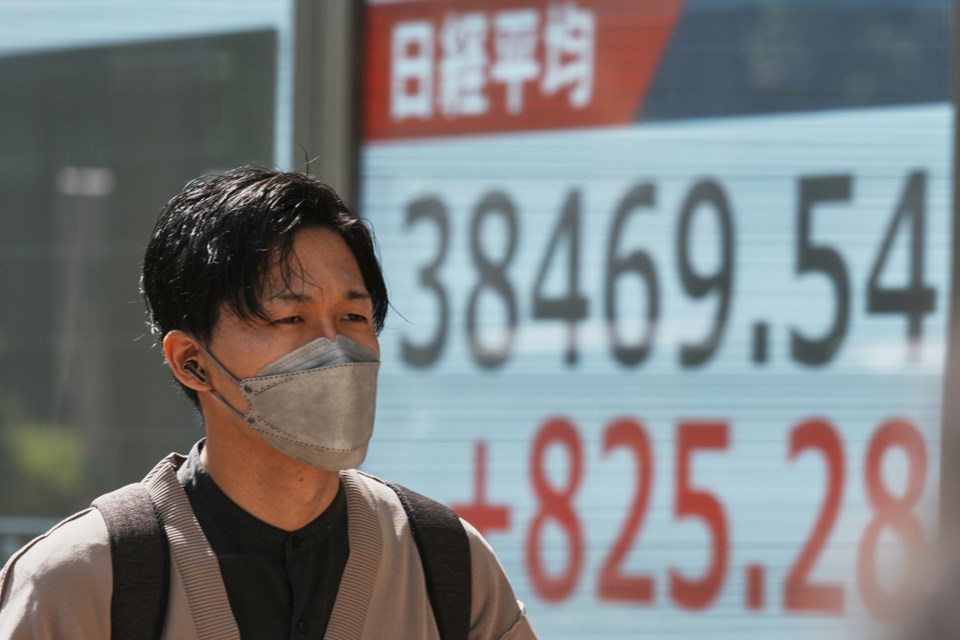Asian shares advanced Tuesday after China and the United States announced a 90-day truce in their trade war, but the gains were tempered by uncertainties over the longer term, as analysts warned President Donald Trump’s policies could still quickly change.
The United States and China said in a joint statement that it will cut tariffs on Chinese goods to 30% from as high as 145%. China, meanwhile, said its tariffs on U.S. goods will fall to 10% from 125%. The 90-day pause gives time for more talks following the weekend’s negotiations in Geneva, Switzerland, which the U.S. side said yielded “ substantial progress.”
The outcome surpassed most expectations, reassuring investors," said Stephen Innes of SPI Asset Management.
“Make no mistake, this was highly stage-managed diplomacy. But the optics are good and the implications real. It signals that even this administration recognizes the economic drag of unrelenting tariffs,” he said in a commentary.
Tokyo's Nikkei 225 jumped 1.8% to 38,326.37. Automakers were among the big gainers, with Toyota Motor Corp. up 3.7% and Suzuki Motor Corp. 4.6% higher.
Nissan Motor Co. added 3.2% after Japan's national broadcaster NHK said it plans to lay off more than 10,000 of its workers, raising the total to 20,000, as part of its restructuring efforts. The company was due to announce its financial results for the last fiscal year later Tuesday.
The Kospi in South Korea gained 0.2% to 2,612.30.
Hong Kong's Hang Seng, which gained 3% a day earlier after Chinese and U.S. officials announced the agreement to pause tariffs and reduce them, fell 0.7% to 23,374.06 on heavy selling of technology shares.
The Shanghai Composite index edged 0.2% higher to 3,374.93. Taiwan's Taiex jumped 1.9%.
Australia's S&P/ASX 200 climbed 0.6% to 8,281.40.
On Monday, the world’s two largest economies agreed to take down temporarily most of their tariffs against each other.
The S&P 500 shot up 3.3% to pull back within 5% of its all-time high set in February. It’s been roaring higher since falling nearly 20% below the mark last month on hopes that President Donald Trump will lower his tariffs after reaching trade deals with other countries.
Closing at 5,844.19, the index at the heart of many 401(k) accounts is back above where it was on April 2, Trump’s “Liberation Day,” when he announced stiff worldwide tariffs that ignited worries about a potentially self-inflicted recession.
The Dow Jones Industrial Average jumped 1,160 points, or 2.8%, to 42,410.10. The Nasdaq composite surged 4.3% to 18,708.34.
A global economy less burdened by tariffs will likely burn more fuel, so the agreement to scale back tariffs by more than what many investors expected also boosted oil prices. But early Tuesday, they fell back. U.S. benchmark crude oil lost 6 cents to $61.89 per barrel. Brent crude, the international standard, shed 8 cents to $64.88 per barrel.
The value of the U.S. dollar strengthened against everything from the euro to the Japanese yen to the Swiss franc. And Treasury yields jumped on expectations that the Federal Reserve won’t have to cut interest rates as deeply this year as earlier expected.
Early Tuesday, the dollar was trading at 147.98 Japanese yen, down from 148.47 yen. But it gained against the euro, climbing to $1.1101 from $1.088.
The move announced Monday could add 0.4 percentage points to the U.S. economy’s growth this year, according to Jonathan Pingle, U.S. chief economist at UBS. The U.S. economy shrank at a 0.3% annual rate in the first three months of the year.
Big challenges remain in the negotiations between Beijing and Washington. to finalize all the details.
But many Asian countries have yet to negotiate tariff-alleviating deals of their own.
The U.S.-China pause followed a deal the United States announced last week with the United Kingdom that will bring down tariffs on many U.K. imports to 10% but will still require weeks
Economic reports scheduled for later this week, including on inflation and sentiment among U.S. consumers, could show how much damage to the economy has been inflicted by the uncertainty over tariffs.
Many retailers rose because much of what they sell comes from China and elsewhere in Asia. Best Buy jumped 6.6%, and Amazon rallied 8.1%.
Smaller U.S. companies whose livelihoods depend more on the strength of the U.S. economy than their bigger rivals saw strong gains, with the Russell 2000 index jumping 3.4%.
Apparel companies that source much of their supplies from China also gained. Lululemon leaped 8.7% and Nike rose 7.3%.
Travel companies jumped on hopes that lower tariffs would encourage more customers to feel comfortable enough to spend on trips. Carnival rose 9.6%, and Delta Air Lines climbed 5.8%.
__
AP Business writers Stan Choe and Matt Ott contributed.
Elaine Kurtenbach, The Associated Press



